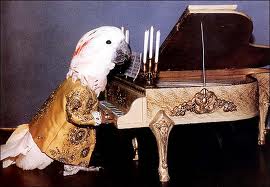 Music is a language that touches the human soul. Everyone has experienced those times when they’ve heard a song that seems to hit them at the very core of their being and bring chills to the back of the neck. None of us can explain why certain songs do that for us. It could be the sound of the drums and guitars, the strings, the way the bass line grooves, the melody, the painful feeling in the singer’s voice, the lyrics .. or any variety of reasons. We only know that our “soul” responds to the music in a deep way, as if something came along and woke it up. For a moment, we are consumed by the music, almost inside of it as if we ourselves are singing the song from the inside while we hear it. We feel the music completely.
Music is a language that touches the human soul. Everyone has experienced those times when they’ve heard a song that seems to hit them at the very core of their being and bring chills to the back of the neck. None of us can explain why certain songs do that for us. It could be the sound of the drums and guitars, the strings, the way the bass line grooves, the melody, the painful feeling in the singer’s voice, the lyrics .. or any variety of reasons. We only know that our “soul” responds to the music in a deep way, as if something came along and woke it up. For a moment, we are consumed by the music, almost inside of it as if we ourselves are singing the song from the inside while we hear it. We feel the music completely.
As music creators we strive to make music that touches people in this way. If music is a language then it only makes sense to treat it as such and attempt to understand “why” various musical approaches seem to carry more meaning, or affect the listener in some way more than others. This is why I’m such a big believer in analyzing good music where ever you find it. If we can somehow understand those musical concepts that seem to work well, or understand why something sounds good to us, then we can lift that musical DNA to re-apply it in our own ways to our music. In the same way that we learn to talk by imitating what we hear as toddlers, we eventually pick up enough bits of language to start making our own sentences. Music works the same way. I remember listening to some of my favorite musicians as a kid, and trying to learn their guitar solos note-for-note. Then months later I’d be jamming with some of my friends and someone would say, “hey that sounds like something from Santana” or “how to you get that Mark Knopfler sound in your playing”. I started to realize that learning other people’s musical approach would eventually seep into your own playing, just as a child picks up the accents and phrases of the people they are trying to imitate, eventually forming their own sentences with all that they learn. By contrast, a parrot only imitates exactly what it hears, but never understands the underlying meaning of anything it is saying, and is unable to come up with its own sentences. If we truly want to speak music with our own voice, then we need to eventually move from being a musical parrot, to one who speaks music with of our own voice and ideas.
In other words, “steal those good ideas that seem to work” and reapply them in your own ways to your music, but seek to understand why things work. Composers have been doing this for centuries. Musicians are always influenced by the other music around them. Nobody creates in a vacuum. I’m not saying to copy, verbatim, anyone else’s music and call it your own. But if you can dig down and make sense of the concepts underlying those songs that really touch you, and understand how they tick (musically speaking), then you come away with a better understanding of how to use those same techniques in your own compositions.
 I taught guitar for several years and a lot of my students were teenagers who were just starting to pick up the instrument after mastering the video game “Guitar Hero”. One of the things that used to bother me was when I would find students who relied so heavily on learning songs from guitar-tablature sites on the internet without any interest in learning about the musical concepts within those songs. It used to frustrate me when I would ask these same students questions like, “hey , do you know why that songwriter chose that group of notes to use against that chord to get such a cool sounding part?” or “what scale do you think Jimmy Page used when he came up with that great riff?”, or “what chord are you playing there?”. Usually the student would look at me with a confused expression and ask me why they should ever need to learn these musical details when they could already play the song from the tab. This is when I would try to teach them that it was important to try to understand “why” things sound good, to get the most from learning someone else’s song. This is the payoff for taking the time to learn someone else’s musical approach … it helps you learn how to come up with your own approach to writing music. Somehow that point was missed by some of my young students. Maybe it has become too easy to learn things from a tab site on the internet rather than spending hours dropping a record needle onto your favorite album to pick up something off of a record, listening closely over-and-over until your dad bursts into your bedroom and shouts, “turn that shit down!” (I’m sounding like an old guy now).
I taught guitar for several years and a lot of my students were teenagers who were just starting to pick up the instrument after mastering the video game “Guitar Hero”. One of the things that used to bother me was when I would find students who relied so heavily on learning songs from guitar-tablature sites on the internet without any interest in learning about the musical concepts within those songs. It used to frustrate me when I would ask these same students questions like, “hey , do you know why that songwriter chose that group of notes to use against that chord to get such a cool sounding part?” or “what scale do you think Jimmy Page used when he came up with that great riff?”, or “what chord are you playing there?”. Usually the student would look at me with a confused expression and ask me why they should ever need to learn these musical details when they could already play the song from the tab. This is when I would try to teach them that it was important to try to understand “why” things sound good, to get the most from learning someone else’s song. This is the payoff for taking the time to learn someone else’s musical approach … it helps you learn how to come up with your own approach to writing music. Somehow that point was missed by some of my young students. Maybe it has become too easy to learn things from a tab site on the internet rather than spending hours dropping a record needle onto your favorite album to pick up something off of a record, listening closely over-and-over until your dad bursts into your bedroom and shouts, “turn that shit down!” (I’m sounding like an old guy now).
I’m sure there are plenty of song writers out there who rely on gut instinct to write their material, without actually knowing any of the musical concepts behind their work. Although it may not be completely necessary to understand music theory to make good music (I’m sure that the Beatles didn’t know this stuff, although I’m sure that George Martin did!), I’m only saying that it can greatly help you to learn and make sense of what you hear and understand it. Knowledge of this stuff doesn’t create great music. That only comes from your creativity. But these concepts can definitely be useful to have in your toolkit, at the very least, for opening up some ideas when composing or arranging parts. More often than not in the course of writing a song, I will hit a musical roadblock – “how do I allow this melodic phrase to continue to go into this direction upwards, while allowing the bass line to continue moving downward?” That’s when I have to start applying some music theory concepts to provide me with some options to solve this kind of roadblock and make things fit musically. A lot of times, if I find a solution by accident I realize later that the solution “works” because it follows some basic principle that I learned from studying music theory. That’s when I have the “aha” moment and realize that I keep learning with every new roadblock that I have to solve.
So my advice is this: No matter what instrument you are most comfortable with, learn about music itself. Don’t be intimidated by it. Learn to read and write music if you don’t already. (we guitar players are some of the worst offenders here – sight reading is an area that I’ve always struggled to master) Learn about chords and scales, chord progressions, harmonization of melodies, chord substitutions, modes, and all that stuff that’s supposed to be the boring music-theory stuff. Lift ideas from everywhere and everyone, when you find something that bends your ear. Then internalize this stuff and use it to help you make better music. Be like a little kid who is curious about everything musically. I guarantee you that it will make you a better music creator!
I’ll be writing some future blog posts about various music theory topics that have helped me the most in song writing and improvising, for anyone interested in this area. I’m a constant student of musical approaches that can help me come up with new sounds or ways to approach improvising.
O.K. I’m done preaching now.
